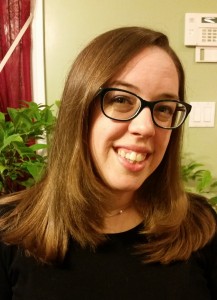Bethany Antos is an archivist at the Rockefeller Archive Center in Sleepy Hollow, New York. She lives in Ossining, New York, and has been a member since 2008.
 Alma maters: BA (history and communication arts), Gordon College, 2005; MA (history), Western Connecticut State University, 2010
Alma maters: BA (history and communication arts), Gordon College, 2005; MA (history), Western Connecticut State University, 2010
Fields of interest: Short answer: They change many times a day!
Long(er) answer: I work directly with over 100 researchers each year (many of whom visit the archive center in person), in addition to interacting with the 400+ researchers who visit us annually. Each researcher’s topic is unique and nuanced, and it is my job to help them navigate our collections and find the materials that are relevant to their project. For instance, in the morning, I might be wrangling with family planning programs in India, at lunchtime I might be investigating the Rockefeller Foundation’s refugee scholar rescue efforts during World War II, and before I leave for the day, I might venture into the Ford Foundation’s human rights initiatives in Brazil.
When did you first develop an interest in history?
My initial interest in history was born out of a love of reading. As a child, I read voraciously. Although I have a vague recollection of reading biographies of Harriet Tubman and Amy Carmichael, for the most part, my tastes ran towards fiction (still do!). Nevertheless, even my fiction books provided glimpses into history that piqued my curiosity.
My 7-year-old self first learned of World War II through the relocation of the Pevensie children in C.S. Lewis’ The Lion, the Witch and the Wardrobe. My 9-year-old self related to American Girl Molly McIntire on a deep spiritual level (oh, the agonies of living with stick-straight nondescript brown hair and glasses!) and also experienced life on the American home front. My 11-year-old self encountered the British Empire (and many a murder) while travelling around England and the world with Agatha Christie and her sleuths.
As I grew older and sat through more history classes in school, it eventually clicked that I could place the characters and situations I read about within actual—real!—historical contexts. I discovered that I loved finding out about history, with all its quirky details and broad themes.
Have your interests evolved since graduation? If so, how?
Both my undergraduate and graduate degrees were pursued with the intent of applying them in an archival setting. Upon graduation from college, I was hired by the Rockefeller Archive Center (RAC) to work as a processing and reference archivist. (“Processing” is the intellectual and physical arrangement and description of a collection.) Processing and reference go hand-in-hand: if a collection is poorly organized, or the folder titles are confusing or meaningless, the reference archivist cannot help the researcher find the relevant files. Having a broad understanding of history, as well as an understanding of how historical research is conducted, is vital to being a good archivist.
Why have you continued to be a member of the AHA?
I have found that paying attention to AHA helps me to gauge trends in historical research, so that I can speak intelligently to my researchers’ topics when they visit the archive center.
Do you have a favorite AHA annual meeting anecdote you would like to share?
I have been able to attend three AHA annual meetings since I became a member, and it is hard to tell which I enjoy more—attending sessions that include researchers who have done research at the archive center, or attending sessions that have absolutely nothing to do with the materials at the archive center!
It is always a pleasure to reconnect with archive center researchers; to hear where their research has taken them (both physically and topically), and to see how their findings at the RAC contributed to their project as a whole. Though it may seem silly, I spend chunks of time poring over the annual meeting program, highlighter and pen in hand, scribbling “RAC researcher” or, even more satisfying, “Bethany’s researcher” next to the entries.
However, as fun as that is, I can honestly say that I find equally enjoyable the opportunity to attend sessions that I know nothing about, other than that they sound interesting or weird or just plain quirky! I have always found the AHA presenters and audience to be gracious, especially to those who might not have a background in their subject. I would encourage everyone at the next AHA meeting to step out of their area of expertise at least once. Pick a random session! Meet people with completely different interests! You might find a new passion!
Other than history, what are you passionate about?
This question could sound a bit like a dating website one, but we will give it a go anyway. I generally eschew long walks on the beach, but I do like to eat out at restaurants … chain restaurants. A few years ago, a friend introduced me to Korean dramas (with subtitles, of course), and they acted as a gateway into the world of Korean pop music, to which I am now more or less addicted. I remain a fan of Doctor Who (both the classic and current versions—Tom Baker is my doctor!), and in between all these, I manage to squeeze in watching some baseball (Yankees and Mets), football (Jets and Giants), and even golf and NASCAR.
AHA members are involved in all fields of history, with wide-ranging specializations, interests, and areas of employment. To recognize our talented and eclectic membership, AHA Today features a regular AHA Member Spotlight series.
This post first appeared on AHA Today.
This work is licensed under a Creative Commons Attribution-NonCommercial-NoDerivatives 4.0 International License. Attribution must provide author name, article title, Perspectives on History, date of publication, and a link to this page. This license applies only to the article, not to text or images used here by permission.
